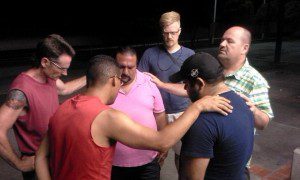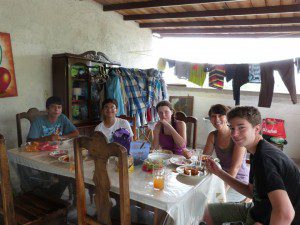Implications of Micah 6:8 for global mission
Micah 6:6–8
With what shall I come before the LORD and bow down before the exalted God? …He has shown you, O mortal, what is good. And what does the LORD require of you? To act justly and to love mercy and to walk humbly with your God.

Confession, compassion and challenge: building lasting friendships between the men of NLCC and Pan de Vida.
“We will see you soon! Is your church ready to receive the team from North Langley Community Church? Do you need anything?”
“¿Sería posible…?” The Skype connection between Vancouver and Mexico was lagging, but this hesitation was more than just a network glitch. Pastor Carlos clearly wished to say something, but seemed reluctant. “Is possible that you come antes, before?”
“Before the seventeenth?” I asked, bewildered.
“No, no,” he shook his head. “Before the team come, solo ustedes? Just you, maybe three days before?”
“Oh! I’ll find out. Is there a problem? Do you need more help?”
Carlos pulled his beard, clearly embarrassed. “We think only this visit it is so busy, we no have time to – como se dice?” His wife Karla prompted him. “Time for to do nada, nothing. Like says Pablo el apóstolo: I no want yours, just you!”
Now it was I who felt embarrassed, chastened by his quote from 2 Corinthians 12:14. Here I was, the stereotypical Westerner, hyper-focused on function, while my brother in the Global South was looking for friendship.
What the Lord requires

Children of prostitutes, gathered at the soup kitchen: “Why are we hitting the ball with sticks? Why can’t we just kick it, like in a real game?”
Affluence affects different people in different ways. In the days of the prophet Micah, Israel was enjoying a prolonged period of economic prosperity. Unfortunately it was also a time of socio-political and moral corruption, as the wealthy upper class enriched themselves at the expense of the poor. One can imagine the indignation of the prophet who came from the impoverished village of Moresheth-Gath in southern Judah.
“And what does the Lord require of you? To act justly and to love mercy and to walk humbly with your God.”
A shortcut to faith?
Justice. Mercy. Humility. Universally accepted Christian values, easily overlooked when one has the financial resources to buy, say, a thousand rams and ten thousand rivers of oil.
Micah is speaking to the appallingly wealthy; by global standards, he is speaking to us. With decades of colonialism and flagrant opportunism fueling a social gospel movement, well-intentioned expenditures have been poured out upon impoverished communities in the flurry of activity associated with short-term missions. Ironically, this often creates economic dependency within a relational void, and leads to jealous disunity among the very peoples we desire to bless.
Paternalism reinforces the passivity of poverty, setting up wealthy patrons as heroes, without allowing others to be agents of their own transformation. This shortcut to faith undermines the very vindication God desires to bring to the oppressed. This is what happens when justice is championed without mercy or humility.
While justice must always address immediate, urgent needs, mercy – chesed, loving kindness – seeks the highest, ultimate good for the one in need. This may entail restraint in giving to avoid creating unhealthy dependencies. Then, when the natural confidence of wealth assumes superior discernment, humility requires that we allow those in need of change to determine the necessities, goals and pace.
In brief, if we would “do justly,” we must also “love mercy” and “walk humbly.” While justice impels us to act, mercy demands that we reflect on the impact of our actions and humility requires that we surrender our own agenda.
Act, reflect and surrender
Both MB Mission and ICOMB encourage global partnerships of mutuality and relational equality, where development is not done for others but with them.
In NLCC’s church-to-church partnership with Pan de Vida church in Mexico, this means spending less of our money and more of ourselves. While money is spent on indigenous leadership development and equipping their church for sustainable outreach, our lives are spent building friendships.
When in Colima, our team members are split up and housed with local families, a stark inversion of the power-broking pyramidal structure of paternalism, as we gringos become helplessly dependent on our hosts. We bridge the language barrier as best we can; eating, playing and laughing at the hilarious faux pas of our cultural illiteracy.
We try to listen more, opine less, learn always.
Our Latino brothers and sisters teach us to value process over product, passion over perfection, crisis as an opportunity for intimacy. We learn to define “family” as all who cross our threshold, and to know that God is in the details. We leave inspired to join God on his mission with those across our table, across the street, across town or across the ocean.
Global church partnerships
Our sister churches in the Global South are not problems in need of fixing, but fellow travellers on the Christian journey, in search of companionship. Some are struggling to apprehend their global MB identity. Partnership with a well-established Western church, strengthened by sending and receiving of short-term teams and reciprocal leadership exchanges, could do much to deepen understanding.
A primarily relational approach to mission may be slow, but lasting change occurs only when the initiative for self-improvement comes from within. It calls for justice, mercy and humility, and it is a long-term investment.
But then, friendship always is.
 —Nikki White is a recent graduate of MBBS Canada, where she completed a graduate degree in biblical studies with a concentration in cross-cultural ministries. Her undergraduate studies in fine arts were done over the course of six years while working and ministering in Colima, Mexico, followed by eight years serving in worship and prayer ministries within the Vineyard movement. Since 2010, Nikki has helped to develop a church-to-church global partnership between North Langley Community Church and Iglesia Pan de Vida, a Mexican MB church plant in Colima. Nikki and her family have attended NLCC for 14 years, where she oversees curriculum development and training of prayer ministry teams. As an artist, writer and musician, she is passionate about facilitating authentic and intimate encounters with God that cross cultural, linguistic, and denominational barriers. She is pictured with Gloria, who, after three years of hosting teams from Canada, “finally lost her heart to Jesus in 2015.”
—Nikki White is a recent graduate of MBBS Canada, where she completed a graduate degree in biblical studies with a concentration in cross-cultural ministries. Her undergraduate studies in fine arts were done over the course of six years while working and ministering in Colima, Mexico, followed by eight years serving in worship and prayer ministries within the Vineyard movement. Since 2010, Nikki has helped to develop a church-to-church global partnership between North Langley Community Church and Iglesia Pan de Vida, a Mexican MB church plant in Colima. Nikki and her family have attended NLCC for 14 years, where she oversees curriculum development and training of prayer ministry teams. As an artist, writer and musician, she is passionate about facilitating authentic and intimate encounters with God that cross cultural, linguistic, and denominational barriers. She is pictured with Gloria, who, after three years of hosting teams from Canada, “finally lost her heart to Jesus in 2015.”

